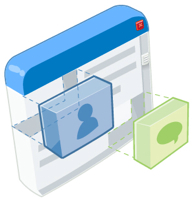The consistently thought-provoking Chris Brogan explores how current digital tools  provide for greater freedom in employment and life in general. Chris makes some prescient pontifications on technologies and ponders why one should focus on being more mobile or consider being more nomadic. His post explores the equation from the perspective of the nomad. I wonder what the perspective is from the other side – from those that would consider the nomad’s services. He raises the critical question about data security and I wonder if this doesn’t extend to a larger question of trust. I have only rarely been on the nomadic employing side of the equation, but even by appreciating the nomadic perspective, I am challenged to feel comfortable with the nomad. It’s not really about the results – or about my level of trust. I agree with Chris and with Mark Harrison who affirmed that the nomad should be paid for delivering results. What concerns me is the breadth of digital relationships.
provide for greater freedom in employment and life in general. Chris makes some prescient pontifications on technologies and ponders why one should focus on being more mobile or consider being more nomadic. His post explores the equation from the perspective of the nomad. I wonder what the perspective is from the other side – from those that would consider the nomad’s services. He raises the critical question about data security and I wonder if this doesn’t extend to a larger question of trust. I have only rarely been on the nomadic employing side of the equation, but even by appreciating the nomadic perspective, I am challenged to feel comfortable with the nomad. It’s not really about the results – or about my level of trust. I agree with Chris and with Mark Harrison who affirmed that the nomad should be paid for delivering results. What concerns me is the breadth of digital relationships.
I have always shied away from contractual arrangements personally. I believe (perhaps naively) that if a relationship works for both parties, then it will be perpetuated. Maybe that’s overly Utopian thinking. Nonetheless, it does boil down to a trust issue and in a complex world, trust has to be measurable, demonstrable and to extend outside of the immediate relationship.
Increasingly, digital transactions have attempted to commodify trust. eBay is a good example. The traditional auction, mediated only by the slightly familiar auctioneer has become more information rich based on transparent historical transaction data and more visible reputation. This has theoretically allowed for more informed transactions. The visible social graph beyond eBay has extended this into the employment sphere. The traditional (perhaps mythical) one-on-one employment relationship has become more rare. Employers often must account for their business actions to investors, vcs, outside auditors and the like. Thus, while I may have implicit trust in your ability to deliver results, that trust cannot be tangibly extended/conveyed to third parties. The current inability to commodify this trust gets in the way of digitally nomadic employment schemes. I am not arguing that they are not potentially far more efficient for both parties, only that we don;t have a means to adapt them to employment infrastructures that remain traditional.
I guess this is really starting to range into a discussion of social capital. I wonder whether this is something that OpenSocial has any promise of addressing more immediately. I think it’s quite possible that an informal measure of social capitalization (I use that phrase deliberately) can be garnered through casual observation of wall posts in Facebook or posted application responses.
Wouldn’t it be cool if a digital scoreboard existed that allowed for a more granular demonstration of achievements that provided a measurability of personal trust and professional competence. Wow…that’s way too Orwellian.

So I think that some of the digitizing and commoditizing and the contract-requirements of having a nomad on staff fall into a few buckets: one, it makes the transaction obvious, with clear beginnings and ends. Two, it means that higher ups better understand the flow of value back and forth (thinking of the enterprise landscape- not as important in a startup).
But yes, TRUST becomes really important. Think about a Sarbanes-Oxley world’s trust. Think about even more stringent requirements in the medical world. How do these digital nomads gain access to be helpful remotely while not compromising the data integrity of an organization?
Seems like an opportunity to build out even more transactional relationships, if only for the business operations side of things.
With humans, it’s always about trusting and forming a relationship. And you asked if you were being a bit utopian. Maybe. But that’s not *all* bad. : )